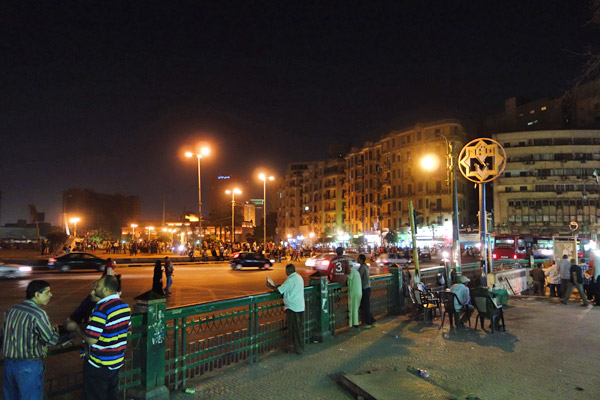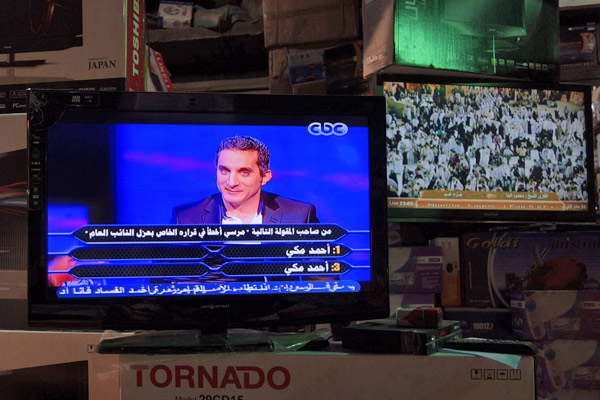
Egypt's President Hosni Mubarak, who ruled the country as a dictator for three decades, was deposed on February 11, 2011. The revolution here is barely two years old, and any visitor to Cairo with an interest in peoples' struggles (like me) will find plenty of opportunities to learn more.
I'm staying at the deluxe Four Seasons Nile Plaza -- perhaps the fanciest hotel in North Africa. Touring the elegant Presidential Suite of the hotel where Hillary Clinton booked out an entire floor for her stay, I comment that luxury like this corrupts anyone. The elegant young woman showing me around sensed I was talking about Egypt's ruling elite and agreed, saying, "President Morsi is in shock. Our leaders went from prison and life in hiding to hotel rooms like this. It's clear the Muslim Brotherhood doesn't understand how to run a government. They still act like they are in the underground. You cannot rule a country from the underground." She said, "We are fed up. If a taxi driver ran against our president today, the taxi driver would win."

Cairo's main square, Tahrir Square, was the center of the massive political upheaval that finally toppled Mubarak in 2011.
I went straight to Tahrir ("Liberty") Square, which served as the epicenter of Egypt's popular uprising and was made famous by the revolution. It feels battered and exhausted. The hub of this vast city -- with a traffic-control situation permanently on yellow light (no red, no green) -- carries the mood of a party that's over, and only the thugs stayed. This city has endured a frenzied political mosh pit and is nursing its wounds before the next round.
Driving around Cairo's "Freedom Square," you have a sense that there's history in the making here for a great nation. The headquarters of Mubarak's party stands empty and blackened by fire, left as a poignant memorial to the people's accomplishment...and, perhaps, as a warning to future leaders. Join me for a spin.
Walking by a wall of powerful political murals, I dead-ended into a street literally walled off by six-foot-square concrete bricks. Staring at the wall, which looked like sixty stone dishwashers stacked neatly seven layers high, I thought, "This feels like an American Embassy neighborhood." Then, looking beyond the barrier, I saw the Stars and Stripes hanging limp in the mucky air.
A new attraction in Cairo is feeling the pulse of the people's struggle for freedom by enjoying the political murals facing Tahrir Square.
New fortifications feel like they're here to stay. Banks have newly constructed blast barriers. Hotels have tall, artfully designed yet no-nonsense security gates. Foreign schools and government buildings shrink behind newly beefed-up walls. With the success of the revolution, the police force basically melted away. The result: Along with people simply demanding their freedoms, Egyptian society is also dealing with opportunistic, ready-to-rampage mobs and easily incited religious gangs. As a tourist, I feel safe enough. But it would be a little unnerving to be a minority living here.
I find that this revolution has emboldened people. Listening to the talk in the squares and in the cafés, it seems that suddenly everyone is a politician. Women wearing scarves suck on hubbly-bubbly pipes in impromptu cafés set up on the streets under sexy MTV videos. There are dozens of new talk shows on TV, each filled with political and sarcastic content to counter the dozen government and religious channels playing far-right and conservative programming to their less-educated audiences.
I'm told that Egypt's voters, many of them illiterate, are easy to bribe. In the last generation, the government failed to provide for the needs of its people. As it faded from the hearts of the people, the Muslim Brotherhood filled the gap with effective and appreciated social programs. In the post-revolution election, there was no strong political alternative to the Muslim Brotherhood -- which, in so many ways, was already providing what governments should provide. With this built-in advantage, followed by a barrage of gifts and promises for the poor districts and towns, it's no wonder they won the election. But now the question I hear Egyptians asking their leaders is, "Why aren't you ruling?"
Freedom of the press is new, but it is fragile. Mubarak once said, "Let the dogs bark." But the dogs of the press bit him. The Egyptian press has long been a problem for anyone violating the will of the people. Under the current government, you can criticize, but you cannot insult the president. Just this week, angry fundamentalist crowds stormed "Media City" (the Burbank of Egypt). Talk show hosts had to sneak past the angry mobs. One host, Dr. Bassem Youssef, the closest thing Egypt has to a Jon Stewart, was arrested and then interrogated for his sarcastic political wit that stepped over the permissible line. Today, he's back on the air and, understandably, more popular than ever.

Bassem Youssef, Egypt's Jon Stewart, is using political comedy on TV -- and is fast becoming a voice of the people as well as their hero. Photo by Trish Feaster (for her Egypt blog, see www.thetravelphile.com).